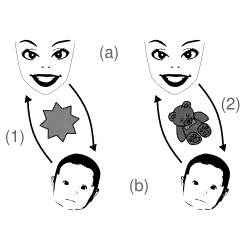慰藉物
慰藉物(英:Comfort object)或过渡物,是一种物件,用来提供心理上的慰藉,尤其是在不同寻常的環境裡。儿童在就寝时也常需要它们。对孩童来说,慰藉物可能是一块毛巾(日语:安心毛布),一个填充玩具,等等。[1]
儿童心理发展

(a)母亲, (b)孩子 (1)幻想, (2)过渡物
在儿童教育领域,常使用被称作“过渡性客体”[2](也称“过渡性物体”[3])的事物,常见的如洋娃娃、泰迪熊、毛毯等,这通常可以在一定程度上从心理层面代替母亲与孩子的关系。
用于心理治疗
在西方,有时填充玩具会被装备在消防车或警车上,这样可以为经历事故乃至创伤性休克的受害者提供慰藉。
心理学家正在进行用厚毛毯代替紧身衣的实验。他们发现,有些罹患自闭症的儿童,在接触到慰藉物后,会变得更加平静,不那么激动。[7]
流行文化
在查尔斯·舒兹所著的《花生漫画》系列漫画中,安全毯一词被使用并流行开来。奈勒斯·潘贝鲁特把一张毯子叫做“安全与幸福之毯”[8][8]
慰藉物的概念在电视连续剧《老友记》中也被提到。"The One with the Pediatrician"一集中,罗斯提醒钱德勒,他带了一张安全毯到大学里。
参见
參考資料
- Iannelli, M.D., Dr. Vincent. . About.com. Dec 12, 2004 [2009-07-17]. (原始内容存档于2013-01-15).
- 《心理与健康》. . 中国数字科技馆. [2022-09-07]. (原始内容存档于2022-09-07).
- 作者:Endevelt-Shapira 来源:《科学进展》. . 科学网·论文. 2021-12-14 [2022-09-07]. (原始内容存档于2022-09-07).
- . Fox News. March 3, 2008 [2009-07-17]. (原始内容存档于2009-03-26).
- Security Blankets for Adults Kathi's Mental Health Review, March 25 2002
- . [2011-08-08]. (原始内容存档于2011-08-13).
- . [2014-10-02]. (原始内容存档于2014-10-06).
- . [2012-07-02]. (原始内容存档于2021-02-25).
扩展阅读
- Abram, J. (1996). The Language of Winnicott. A Dictionary of Winnicott’s Use of Words, Karnac Books, London
- Dell’Orto, S. (2003). W.D. Winnicott and the transitional object in infancy. Pediatric Medicine Chirurgic 25(2), 106-112.
- Mitchell, S. A., Black, M. J. (1995). Freud and beyond: A history of modern psychoanalytic thought. New York: Basic Books.
- Passman, R. H. (1977). Providing attachment objects to facilitate learning and reduce distress: The effects of mothers and security blankets. Developmental Psychology, 13, 25-28.
- Passman, R. H. (1987). Attachments to inanimate objects: Are children who have security blankets insecure? Journal of Consulting and Clinical Psychology, 55, 825-830.
- Passman, R. H., & Halonen, J. S. (1979). A developmental survey of young children's attachments to inanimate objects. Journal of Genetic Psychology, 134, 165-178.
- Passman, R. H., & Lautmann, L. A. (1982). Fathers', mothers', and security objects' effects on the responsiveness of young children during projective testing. Journal of Consulting and Clinical Psychology, 50, 310-312.
- Winnicott, D.W. (1971). Playing and Reality, Routledge, London
- Young, R. M. (1989). 'Transitional phenomena: production and consumption', in B. Richards, ed., Crises of the Self: Further Essays on Psychoanalysis and Politics. London: Free Association Books, pp. 57-72.
- Young, R. M. (1994). Mental Space. London: Process Press.
- Creature Comforts, People and Their Security Objects by Barbara Collopy O'Halloran and Photographed by Betty Udesen.
This article is issued from Wikipedia. The text is licensed under Creative Commons - Attribution - Sharealike. Additional terms may apply for the media files.